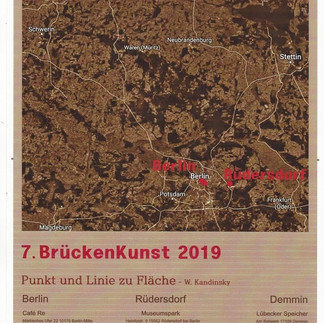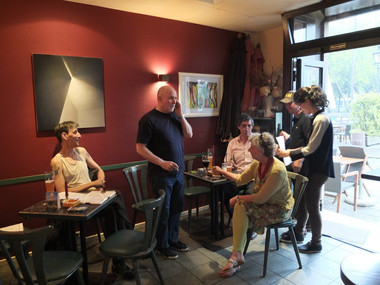
1.) Please tell us a little about yourself. How did you become interested in cinema? My father was a pastor in the Jesus Church in Berlin-Kaulsdorf. My mother worked for years as an artist and designed posters and pictures in Berlin-Kaulsdorf. In 1995 I began my Cultural Studies at the European University Viadrina in Frankfurt/Oder and in 1998-1999 in Krakow and 1999-2000 in Buenos Aires; from 2003 to 2004 I lived in Thailand, Cambodia, and Vietnam. Many of my artistic inspirations come from my experience abroad. After this time, in 2006 I started to make documentary films. My films have been presented at many Film festivals worldwide. In 2009 I received the Golden Palm Award in Mexiko and in Los Angeles a Honorable Mention Award 2009 for a documentary film about Krakow. In the last years, my films were presented at many Filmfestivals worldwide. For example in Bangladesh, France, Switzerland, Canada, and at the Short Film Corner of the Cannes Film Festival. In the last two years, my films have been selected for more than 350 int ́l Filmfestivals. I have received about 70 Film Awards from these film festivals in the last two years. I am also at present making a film about the shadow theater with the artist from Sri Lanka Anurapala Wijayaweera and about a unique Swan family in Berlin-Grunewald together with the American saxophonist and photographer Amadea Leonore – JJ.
2.) Which one of your works is „All short films about the work & the exhibitions of Brückenkunst from 2014 till 2019“, a group of unrecognized artists in Berlin“. How did the main idea of this project strike you? In the year 2013, I was working as a filmmaker in Berlin in the Kreativhaus which is very close to the restaurant Café Re. On my way to work I passed by the cafe and noticed that an exhibition of paintings by a group of painters called „Brückenkunst“ was being held inside the cafe. Naturally, I stopped to see what was going on. The group had invited the general public to their exhibition and to a vernissage. Around this time I was painting my own abstract paintings and organizing art exhibitions, and so I was immediately interested in this group. I attended their exhibition opening. That's where I met the artists. They invited me to work together with them. I happily accepted this invitation and I presented my works from this time together with them. From 2013 until 2020 I was part of the group and I accompanied the group as a filmmaker. The idea was to accompany the group of artists in their work, especially in their projects. Interviews should also be conducted with participating artists and interested visitors.
3.) What do you consider the most important element of documentary filmmaking? With successful production and having enough raw materials, is it possible to achieve a coherent and good film? My motto in filmmaking so far: collect as much film material as possible, because the more material you have, the greater the chance of later having a good and coherent film with a thread running through the film.
4.) Tell us a little about your film. What problems did you face while making it and how did you deal with them?
I mostly film spontaneously and instinctively. For this reason, I try to capture with my camera as best I can the most exciting and interesting moments and record them using the best angles possible. It is my hope to shoot a documentary film that reflects the reality, and the atmosphere, and I hope that the people who are interested in my work can understand my approach, my point of view, and my issue.
5.) What advice would you give those whose who are into documentary filmmaking? I believe that the artist, the filmmaker has to trust the creative process and give it space to develop. The filmmaker must always be open to unexpected or new developments. Films should improve openness in society. Filmmakers should try to make their films in such a way that viewers feel they have learned something new and unknown to them. However, Kieslowski once said, that you can ́t change anything with films. But I mean that Kieslowski was planning to do this with his films, but he claimed the opposite. 6.) As a filmmaker, do you think that a good idea can save work? Is it possible to make a successful film that does not cost much to produce? The best ideas often come spontaneously while filming. For me, coincidence and a happy eye is what is required for the emergence of new ideas. You can't know everything beforehand. Many new things emerge in the course of the work. When I first started making films, I was firmly convinced that this is possible. I now have doubts about it. I think there's a sentiment throughout the movie business that says a movie is only really worth a movie if it's paid a certain minimum amount. 7.) Tell us about your favorite filmmakers – the filmmakers who influenced you the most? "The Pianist" by Roman Polanski is a very strong work and I like the filmmaker Agnieszka Holland. They are very impressive artists and filmmakers. "Schindler`s List" by Steven Spielberg had a strong impact on me. 8.) What effect do you think film festivals have on seeing or ignoring the work of modern filmmakers? I think film festivals besides of Filmschools and TV stations have an important role to discover new talented filmmakers. 9.) Have there ever been ideas you desired to turn into a film and for some reason did not succeed? Years ago I wanted to make a film about a well-known and famous photographer from Berlin. Her name was Helga Simon. For years, I accompanied her with my camera to all sorts of events and to many workplaces. I probably shot hundreds of hours of footage over those years. I interviewed and filmed Mrs. Simon in her studio in Berlin. Despite this, I still haven't managed to make a film about Ms. Simon. The reason for this is probably that in the course of this work, I came to the conclusion that the film would probably not be successful after all. Then at some point, I stopped believing in it. 10.) If possible, tell us about your next project. In the last two years, I was shooting a film about the shadow theater for the conventional stage with the artist – Anurapala Wijayaweera from Sri Lanka and with students of the 6th class of the Spartacus school in Berlin-Friedrichshain. They made together with the artist a big presentation of the shadow theater in a big theater in Berlin. In addition, I make a film together with the American artist Amadea Leonore – JJ about the Swans in Berlin-Grunewald.














Comments